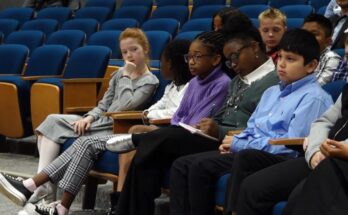Georgia’s recent decision to eliminate the terms “diverse” and “diversity” from its teacher training curriculum has sparked heated debates and raised concerns about the state’s commitment to fostering inclusive classrooms. This article explores the implications of this controversial move, delving into the potential consequences for educators, students, and the broader community.
The Georgia Professional Standards Commission, responsible for setting guidelines and standards for teacher training in the state, made the decision to remove the terms “diverse” and “diversity” from its training materials. This move has garnered significant attention and criticism from educators, activists, and advocates who argue that it undermines the importance of embracing and celebrating diversity in educational settings.
Diversity in education goes beyond race and ethnicity. It encompasses various dimensions, including socioeconomic background, gender identity, sexual orientation, religious beliefs, and abilities. Embracing diversity in the classroom fosters an inclusive environment where students from all backgrounds feel valued, respected, and supported. It enhances cultural understanding, promotes empathy, and prepares students for a diverse and interconnected world.
The removal of “diverse” and “diversity” from teacher training materials raises concerns about the preparedness of educators to address the needs of a diverse student body. Teacher training programs play a critical role in equipping educators with the knowledge and skills necessary to create inclusive classrooms. By omitting these terms, Georgia risks diminishing the emphasis on cultural competence, equity, and social justice in the training of its teachers.
Teachers serve as role models and influencers in students’ lives. Their ability to embrace diversity and create inclusive learning environments directly impacts students’ academic success, self-esteem, and overall well-being. By removing the explicit focus on diversity in teacher training, Georgia may inadvertently undermine the development of educators who are equipped to meet the needs of their diverse students.
Cultural competence is a vital aspect of effective teaching in diverse classrooms. Educators need to understand the unique experiences, perspectives, and cultural backgrounds that shape their students’ identities. By recognizing and valuing these differences, teachers can create an inclusive space that fosters learning, collaboration, and mutual respect among students.
Inclusive curriculum plays a crucial role in reflecting and validating students’ diverse experiences. By incorporating diverse perspectives, histories, and cultures into the curriculum, educators promote a sense of belonging and empower students to engage critically with the world around them. The removal of “diverse” and “diversity” from teacher training materials may inadvertently hinder efforts to develop inclusive curricula that resonate with students from different backgrounds.
Georgia’s decision to remove these terms has sparked widespread concern and outrage among educators, students, and community members who value diversity and inclusion. Activists and advocates are calling for a reconsideration of the decision, highlighting the importance of cultural competence and diversity in education. Community engagement, dialogue, and grassroots advocacy efforts can help raise awareness and influence policy changes that prioritize inclusive education.
The removal of “diverse” and “diversity” from Georgia’s teacher training materials raises significant concerns about the state’s commitment to fostering inclusive classrooms. Recognizing and embracing diversity is essential for creating an educational environment where all students can thrive. It is crucial for educators, policymakers, and community members to advocate for a curriculum and training programs that prioritize cultural competence, equity, and the celebration of diversity. By doing so, Georgia can ensure that its students receive an education that prepares them to navigate an increasingly diverse and interconnected world.





